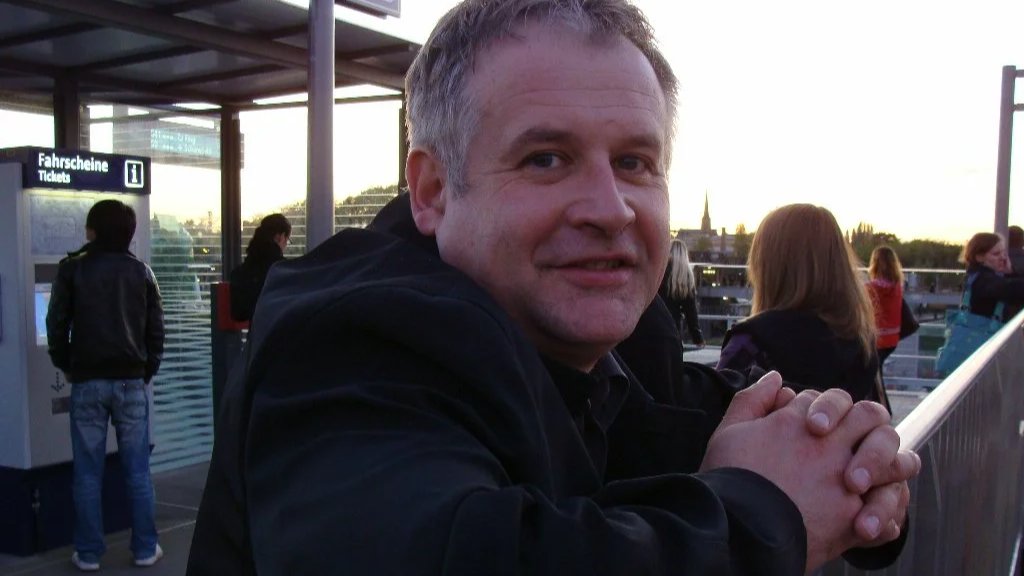Dmitry Kolker, a 54-year-old physical scientist, was accused of the same thing his colleagues who co-operate with foreign educational institutions had been accused of in the past 20 years — committing state treason by handing over classified information to foreign intelligence agencies.
He was a professional organ player, a fan of lasers, quantum technology and Anton Chekhov, and, of course, a family guy.
Read Novaya Gazeta. Europe’s story about what kind of scientist Dmitry Kolker was and who are the people responsible for his death — Detective Morozov and Irina Aliyeva, the judge, who were comfortable with sending a terminally ill cancer patient into jail and are very unlikely to be held accountable in today’s Russia.
Art and science
“A man in his prime,” this is how Dmitry Kolker described himself in his profile on VK, Russia’s most popular social media service. Dmitry’s profile photo shows a sturdy man, looking young for his age, sat before an organ keyboard, and smiling for the camera. VK’s profile form also suggests that users pick up their favourite quote or statement to make it public. Dmitry’s one is from a classic Jewish joke: “— How’s your health? — Don’t hold your breath!”
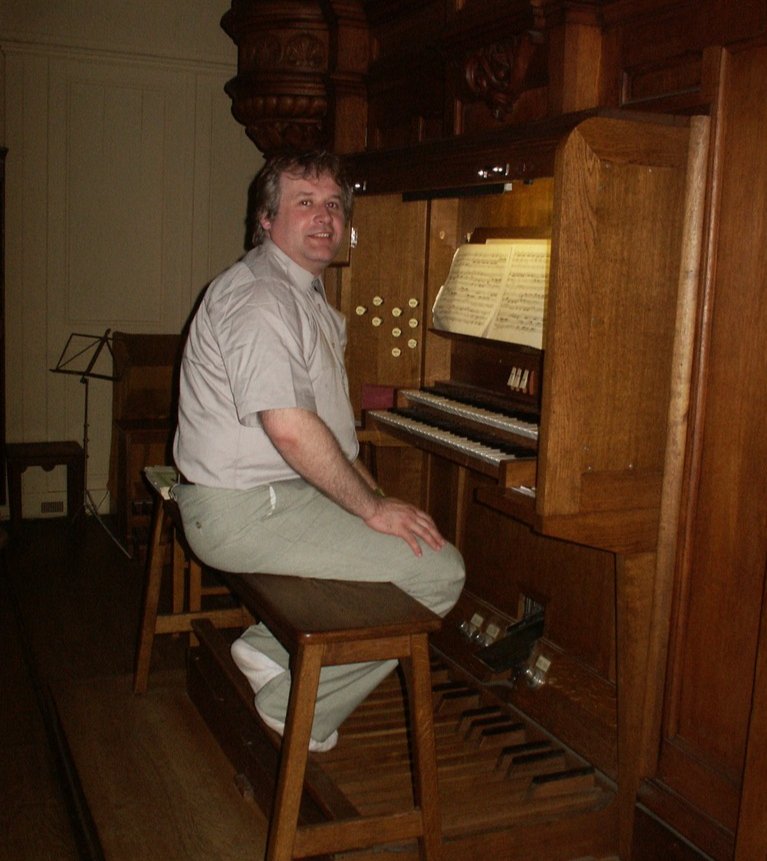
Photo taken from social media
Dmitry passed away 14 days ago. It was then when millions of indifferent people all over the world learned about him, in addition to the global scientific community.
Kolker spent his childhood in Akademgorodok, a quarter in Russia’s Novosibirsk famous for its research institutions — and the heart of Siberia’s science. Dmitry’s grandfather Iosif was into aircraft engineering. He worked alongside Andrey Tupolev, a famous Soviet aircraft designer, and established an aircraft engineering school at the Novosibirsk University where he worked as a teacher. Dmitry’s father Boris Kolker was a physicist and an inventor who was into microelectronics. His works were used for many Soviet electronic devices and gave a boost to the development of the country’s computer industry. Boris Kolker was also a yachting enthusiast; he spent 12 years constructing a 9m long DIY cruising yacht which he named The Prince. So, Dmitry Kolker was destined to become a scientist, although he might have opted for a different path as he enjoyed music ever since he was little. His classmates recall that Dmitry enjoyed studying at a music school and then at a music college, unlike most teenagers. Dmitry was a keyboardist, and his beloved music instrument was the organ. Talking about love, his wife Natalia was also an organ player who often performed live. The couple bore three children: Alina, a girl, and two boys, Grisha and Max, and taught them music, too. They were a happy family and created a space around them where scientists and musicians could speak the same language; many of their friends recall the hearty parties at the Kolkers’ house.
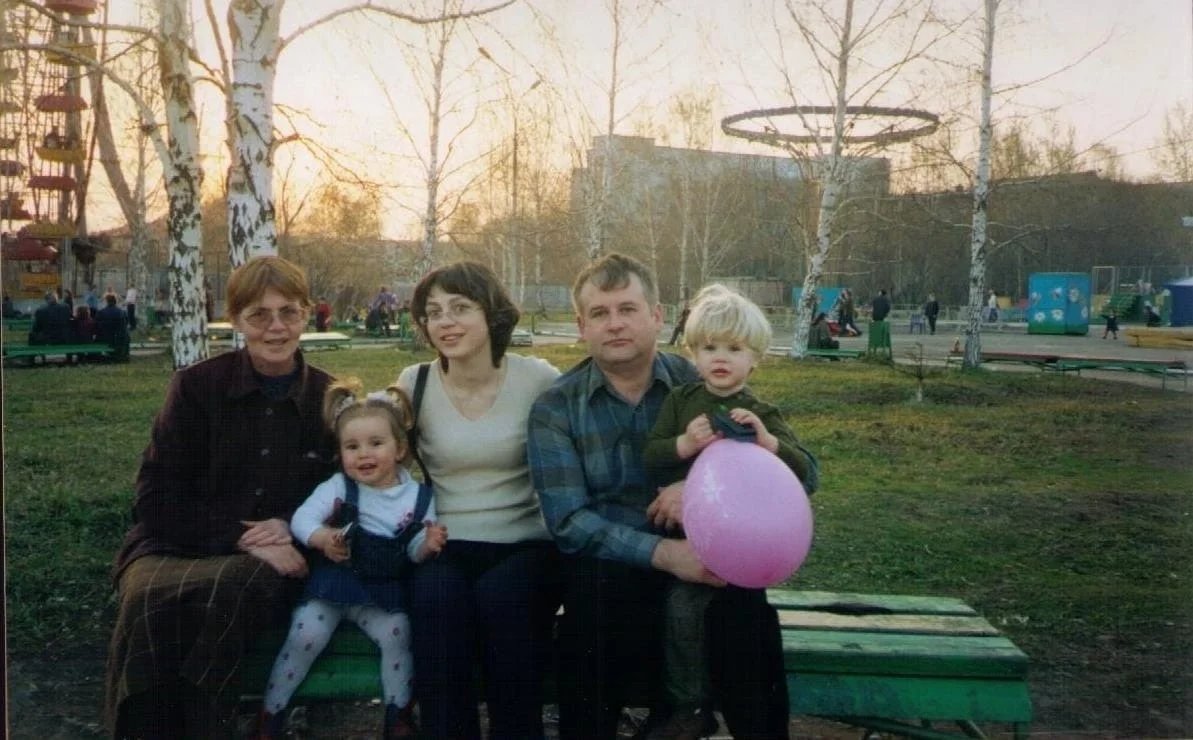
Dmitry Kolker and his family. Photo: Maxim Kolker
But let us get a bit back in time. In the late 80s, Dmitry Kolker was uncertain what to study after school: music or science. He eventually opted for quantum physics and laser systems and finished his PhD thesis in the early 2000s. Later, he spent several years travelling around the world and working at an observatory in France before returning to Novosibirsk to become a university teacher at his own alma mater. Kolker’s students say he was a remarkable lecturer who could bring home the message that physics is not just a bunch of dull formulas, it is an opportunity to create something real and see the product of one’s own work, to become useful to the society and respected all over the world. Kolker established his own lab at the Novosibirsk University in 2015. The facility was (and is) aimed at developing sources of infrared radiation called parametric light oscillators and using them in gas analysis, mostly for medical purposes such as noninvasive diagnostics techniques.
Kolker could be often seen in the local philharmonic hall outside his working hours where he performed music by J. S. Bach, Johannes Brahms, Max Reger, Alexandre Guilmant, Charles-Marie Widor, Olivier Messiaen, Jehan Alain, Marcel Dupré.
Obviously, this is what “treacherous scientists” normally do.
A lecturer in China
In 2018 an organisation called China Talent and Technology Center invited Kolker to Guiyang to deliver a course of lectures on optics and partake in a discussion workshop involving Russian and Chinese scientists. The expenses were fully covered by China; it is common practice for such events. Before Kolker’s trip, a special commission at his workplace, the Institute of Laser Physics, was set up and ruled that Dmitry’s lectures abroad did not include any classified information. So, he left for Guiyang in December 2018, accompanied by an FSB officer, just like in the Soviet times. Kolker read his lectures in Russian since scientists are not allowed to deliver speeches or even talk to their foreign counterparts in English due to Russia’s security protocol.
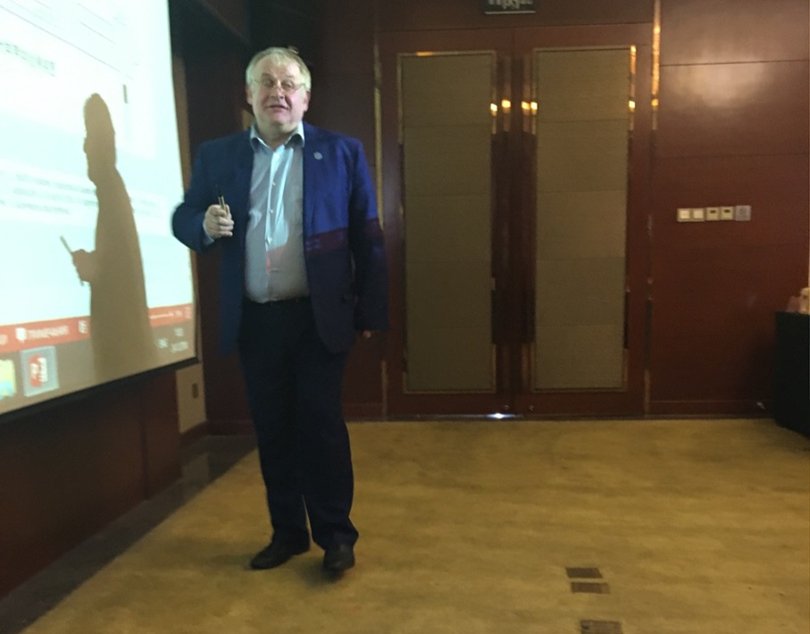
During a lecture on laser physics in Guiyang, China. Photo taken from social media
After Kolker had been arrested, his daughter Alina scrolled up her chat with Dmitry up to December 2018.
“I’m okay here, my first day was alright. I read my lectures in Russian, and my Chinese interpreter did a great job. It’s +10 degrees here, we only have such weather in late September in our place. They welcomed me here. I had I long flight, the city is somewhere near the Indian border. You know what, I’m really homesick. I wish I could be relaxing at home or visiting the philharmonic with your mum now.”
The FSB had no concerns or issues regarding Kolker as he returned to Russia. But in 2022, the security’s First Department, the one responsible for investigating treason and espionage, recalled the trip. The Defence Ministry formally initiated the procedure, claiming that the lectures Kolker read for the Chinese in 2018 contained classified information. It is unknown what evidence the FSB was using against Kolker since his case, just like other cases of this kind, are kept totally secret. It is obvious that someone was regretful about not filing any potential treason charges against Kolker and missing a rank-up opportunity.
They made a mistake, however, and failed to complete the case. Dmitry Kolker died in a pre-detention facility only two days after he had been arrested. By the moment the FSB decided to frame him up for reading lectures in China, he was already terminally ill. Kolker was diagnosed with pancreatic cancer in December 2020 and turned from a sturdy man “in his prime” into an 80-year-old skinny elder in a year’s time.
‘We need to prepare for his quietus’
Pancreatic cancer is one of the deadliest types of cancer, almost an incurable one. Dmitry Kolker was no exception. Three abdominal surgeries and several rounds of chemotherapy did not prevent metastatic spreading as the scientist’s body became as weak as it can be. In the last few months Kolker was only receiving supportive treatment. He had hernia surgical mesh implants and a feeding tube connecting his liver with his veins installed in his body as he could not eat normally. He lost 30 kg of body weight, suffered severe pains, and vomited round the clock. This is why the floor of the Kolkers’ apartment had been laden with plastic bowls in the last months.
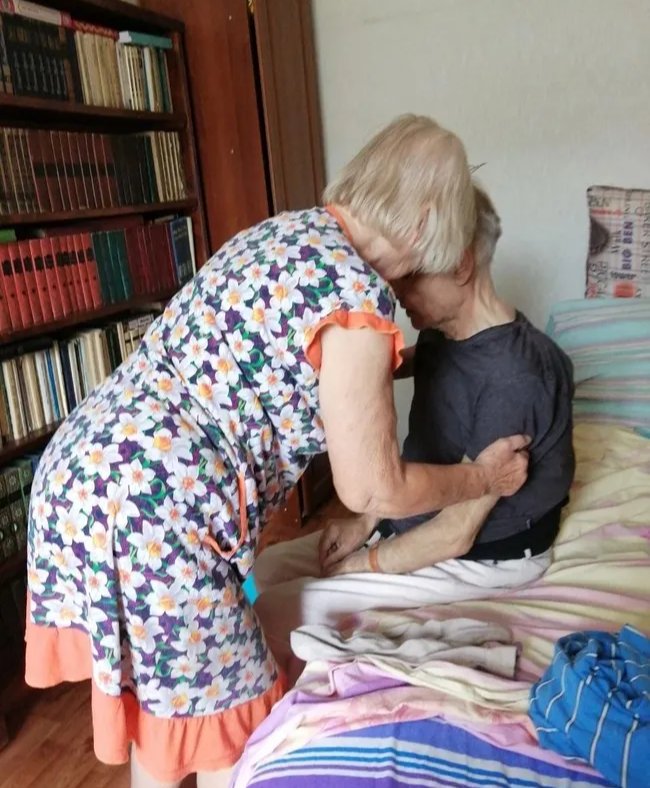
Dmitry Kolker in his apartment before hospitalization, June 29, 2022. Photo by Alina Mironova (daughter of Dmitry Kolker)
Dmitry’s relatives led him around the house by the hand, helped him change, wash himself and follow the medication taking schedule, fed him, and provided him with plastic bowls to vomit into.
The following here is an extract from the WhatsApp chat between Kolker’s wife and daughter, dated one day before Kolker was arrested and three days before he died. These messages were published by his daughter Alina as she wanted to prove that he had indeed been terminally ill and not “simulating a condition” as detectives usually put it in such cases.
Wednesday 29 June 2022 Natalia Kolker to Alina who was out of town and going to arrive shortly:
“His condition, both physical and mental, is bad. He gets very little sleep, and I’m happy to see him doze once in a while <…>. We helped him walk around the house in the morning, he was vomiting. He is really weak and depressed. The last week tired him off completely, he is vomiting all day, his stomach is distended, lots of infiltration [accumulation of excessive foreign substances in one’s cells or tissues]. It is barely operable. Your father is a smart man, he has no illusions on his account. He is preparing to bid his last farewell to everyone, I’m asking the rest of the family to let him say anything he likes, he has every right to do so. He is smart and sensitive man. Max [Dmitry’s son] visited us today and joined us with bringing the bowls to dad’s bed. We called several state hospitals, both in Moscow and Novosibirsk, and a profit hospital, too. We booked an appointment at the surgeon’s and then continued to run around the house with the bowls, rags, and water. Let it be this way. Dad feels better when we are all around him, and we do too. So, he told us to hold each other by the hand. I think the meaning behind this is deep. It’s easier to go through physical pain and mental anguish when you are surrounded by relatives. We took dad to the hospital, but I realise he won’t get any better. We need to prepare for his quietus.”
Max brought his father to the local private hospital for supportive therapy on 29 June. Other hospitals rejected the man. Kolker’s family was going to transport him to a cancer hospital Moscow to help him last a few days longer. These plans served the Kolkers a dirty trick: he was indeed transported to Moscow, but to a jail instead of a cancer hospital. The FSB deprived him not only of the supportive therapy, feeding tubes and general treatment, but also of a chance to die in the bosom of his family.
Detectives came to arrest him in the hospital on 30 June. They forced a regular GP to issue a certificate that Kolker “does not need to be hospitalised.” The certificate said that the scientist suffered from “a regular prostate disease.”
Meanwhile, a separate group of detectives searched Kolker’s lab. His colleagues came to work later and saw that Dmitry’s hard drive had been dismounted from his computer, screws lying on the table.
Aliyeva and Morozov
Irina Aliyeva was appointed judge by presidential decree, just like all judges in Russia. She has been working at a district court in Novosibirsk for two years, having passed judgements on dozens of cases. Fraud, theft, drug possession, disorderly conduct, creating malicious software, this type of things. She would sentence people to imprisonment and huge fines without a second thought, avoiding reflection or career-threatening “not-guilty” statistic. So, she acted like a common judge in modern-day Russia.
And now — a state treason case, FSB involved, a treacherous scientist. Aliyeva could not let the top brass down.
It is challenging to find out what she was thinking of when she saw the terminally ill Dmitry Kolker inside the courtroom cage. She will never tell. Sending an official inquiry is out of the question; Russia’s judges are formally independent and abide by their own creeds after all.
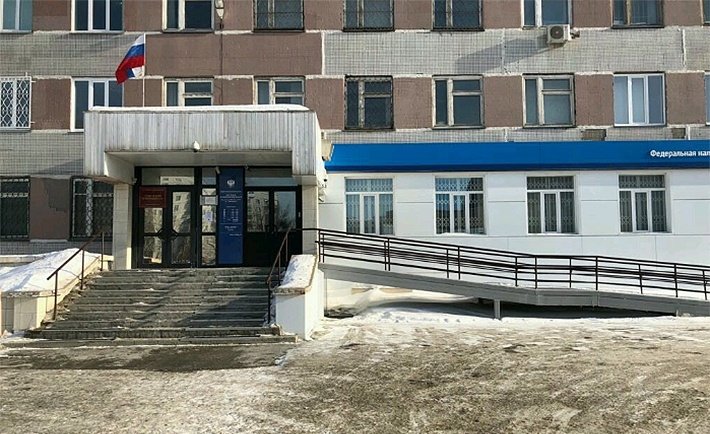
The building of district court in Novosibirsk
Here are Aliyeva’s creeds in Kolker’s case: she sent a terminally ill man who was literally dragged from his dying bed to Moscow to a pre-detention facility, completely ignoring his condition and any papers confirming it. The papers were provided to her, in spite of what Detective Morozov of the FSB’s First Department said in a closed court session.
Putting the moral details aside, arresting a terminally ill person is a violation of each and every legal regulation. The state law prohibits taking people suffering from stage four cancer of any type into custody.
Here is a conversation between Dmitry Kolker and Detective Morozov from the court session of 30 June:
Morozov: “I’m asking the court to send the suspect to a pre-trial facility until 29 August 2022.”
Kolker, from his cage: “Do you think I’m going make it to 29 August?”
Morozov: “We have the medical papers which say you can participate in the investigation procedure; I’m more than certain you’re going to make it.”
Detective Morozov lied. The case had all sorts of medical reports confirming that Kolker was literally dying.
The scientist was provided a court-appointed lawyer; there is nothing to add. Kolker’s family simply had no time to find a proper lawyer for him: it took the FSB no longer than a couple of hours to transport Kolker from his hospital bed to the courthouse. The scientist was later transported to Moscow and put behind bars in the Lefortovo pre-trial detention centre. Alexander Fedulov, the lawyer the Kolkers found, was not allowed inside to see his client; he confirmed this as he spoke to us.
A ticket to die
Kolker was taken to Moscow on a charter flight the same day he was arrested. Even the fact that Kolker had been taking barbiturate painkillers did not make Detective Morozov unsettled.
He saw nothing wrong about a dying man providing testimony while being intoxicated by mind-altering drugs. Such testimony, of course, would have been invalid even if provided.
Kolker knew he would not make it when he was escorted on board the plane. He was allowed to give a 30-second call to his family before the plane took off. He said: “I bid you all my last farewell,” before a guard snatched the phone out Kolker’s hand, throwing profanities at him.
That’s it, Kolker’s family never heard a word from him ever since.
It is unknown what happened to Dmitry Kolker in Moscow during the last hours of his life. “We are trying to get any information on how he spent his last two days, but we have not received any response on our inquires yet,” Alexander Fedulov says.
Dmitry’s daughter Alina, who arrived in Moscow on the following day, was not allowed to deliver any medication for her dying father, and she was not allowed to get him on the phone, of course. The FSB took a nearly dead person hostage. This is their new type of torture.
Alexey, Dmitry’s brother, wrote a complaint, but, unsurprisingly, received no response.
Dmitry Kolker, 54, died at 2:40 a.m. 2 July in an ICU of a hospital located around the corner of the Lefortovo detention facility. His family received a formal telegram by mail, stating the time of Dmitry’s death.
Detective Morozov did not bother giving the Kolkers a call.
At own expense
Dmitry Kolker was transported to Moscow by the FSB when he was still alive — at public expense. His relatives were offered to transport Kolker’s body back to Novosibirsk for burial at their own expense, however. No official bothered helping the Kolkers retrieve the body. Moreover, the body is still in one of Moscow’s morgues due to “paperwork issues.”
The Novosibirsk residents set up a memorial for Dmitry Kolker on 5 July, bringing flowers and candles to Akademgorodok. The memorial was immediately destroyed by the police.
A similar memorial was set up a few days later in the Place de la Bastille in Paris. Obviously, the local police kept it intact.
Another court session was held in Novosibirsk on 11 July. The regional court found Aliyeva’s decision on arresting Dmitry Kolker legitimate. The judge was another woman, Yelena Bondarenko. She defended her colleague Aliyeva and did not blink when she said there had been no medical reports preventing Kolker from being taken into custody during the previous court session despite the fact that the case papers still have such documents. Aliyeva’s career was saved, and no one was held accountable. Bondarenko ignored the fact that a stage four cancer is on the list of conditions preventing people from being taken into custody.
Another appeal will be lodged; the case termination will not do. “Dmitry Kolker’s exoneration will be the only proper outcome of this case,” Alexander Fedulov says.
Dmitry’s daughter Alina said she and her family would not talk to the media before Dmitry is buried: “These are difficult days for us.”
Join us in rebuilding Novaya Gazeta Europe
The Russian government has banned independent media. We were forced to leave our country in order to keep doing our job, telling our readers about what is going on Russia, Ukraine and Europe.
We will continue fighting against warfare and dictatorship. We believe that freedom of speech is the most efficient antidote against tyranny. Support us financially to help us fight for peace and freedom.
By clicking the Support button, you agree to the processing of your personal data.
To cancel a regular donation, please write to [email protected]
